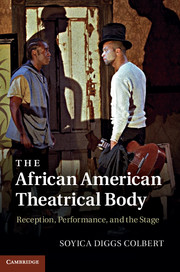Book contents
- Frontmatter
- Contents
- Illustrations
- Acknowledgements
- Overture: rites of reparation
- Chapter 1 Repetition/reproduction: the DNA of black expressive culture
- Chapter 2 Recuperating black diasporic history
- Chapter 3 Reenacting the Harlem Renaissance
- Chapter 4 Resisting shame and offering praise and worship
- Chapter 5 Resisting death: the blues bravado of a ghost
- Chapter 6 Rituals of repair
- Chapter 7 Reconstitution
- Epilogue Black movements
- Notes
- Bibliography
- Index
Epilogue - Black movements
Tarell Alvin McCraney's In the Red and Brown Water
Published online by Cambridge University Press: 05 November 2011
- Frontmatter
- Contents
- Illustrations
- Acknowledgements
- Overture: rites of reparation
- Chapter 1 Repetition/reproduction: the DNA of black expressive culture
- Chapter 2 Recuperating black diasporic history
- Chapter 3 Reenacting the Harlem Renaissance
- Chapter 4 Resisting shame and offering praise and worship
- Chapter 5 Resisting death: the blues bravado of a ghost
- Chapter 6 Rituals of repair
- Chapter 7 Reconstitution
- Epilogue Black movements
- Notes
- Bibliography
- Index
Summary
Tarell Alvin McCraney's In the Red and Brown Water, the first play in the Brother/Sister Plays trilogy, begins “like a chant or a moan.” In the Public Theater production (2009) you hear the central character Oya's “(sharp breath out) Ah!” and then the chorus of characters puzzles over her death (12). With few observations and fewer answers, Oya (Kianné Muschett) confirms, “Oya in the air Oya . . .” (12). Similarly to Blues for Mister Charlie, the play begins with a dead central figure and revolves around figuring out what caused her demise. The play depicts a sequence of Oya's dreams deferred. Oya defers attending a college called State on a track and field scholarship to care for her ailing mother Mama Moja who dies a few months later. Although she runs like the wind, State does not offer her a scholarship for the next academic year. After her mother dies, Oya begins dating Shango (Sterling K. Brown) and yearns for a life with him. Unfortunately that dream must too be deferred; Oya is infertile and unable to consummate her relationship with Shango through the birth of a child, the prize signifier of adulthood in her community. Oya settles for another man, Ogun Size (Marc Damon Johnson), who provides stability but no passion. She longs for a child and spends most of her life sitting on the porch waiting. When she learns, however, that another woman in the neighborhood is expecting Shango's child, she cuts off her ear and bleeds to death, fulfilling the only event in a sequence of deferred desire.
Although McCraney's plays focus on deferred dreams, his career has not experienced postponement, boasting what many theater critics mark as a dream emergence in New York and London. The second play in the trilogy, The Brothers Size, was first produced as a part of Public Theater's Under the Radar Festival in January 2007, and months later premiered in London at the Young Vic to critical acclaim. McCraney's distinctive style, unparalleled at least in recent history, his rocket-like launch to stardom, and his youth (born October 17, 1980) have made him a media darling. Besides receiving numerous awards, including a Royal Shakespeare Company/Warwick International Playwriting Residency, London's Evening Standard Award (for most promising playwright), a National Endowment for the Arts Outstanding New American Play Award, and the inaugural New York Times Outstanding Playwright Award, the young playwright has been lauded effusively by the theater world. According to theater critic Randy Gener, “one quick Google search brings up results that make him seem like the Second Coming: ‘one of the most exciting and distinctive young playwrights to have emerged in many years’ (Oskar Eustis), ‘one of the most startling new voices to emerge in American theatre’ (Emily Mann), ‘actually kind of a miracle’ (Mark Russell), ‘the new Shakespeare’ (Afrodiziak.com) and – my favorite – ‘the sexiest writer in town’ (Evening Standard).” He is well worth the hype, according to New York Times chief theater critic Ben Brantley, who asserts, “Watching [The Brother/Sister Plays] you experience the excited wonder that comes from witnessing something rare in the theater: a new, authentically original vision. It's what people must have felt during productions of the early works of Eugene O'Neill in the 1920s or of Sam Shepard in the 1960's.” McCraney's ability to sample from traditions as diverse as Yoruba cosmology, Federico García Lorca's Yerma, the sounds of Motown, and hip-hop, as well as to signify on the theatrical innovation of Zora Neale Hurston in his use of bawdy comedy and folk traditions, August Wilson in his syncretism and resistance to teleology, and Suzan-Lori Parks in his formal conventions, advances black theater in a new and exciting direction.
- Type
- Chapter
- Information
- The African American Theatrical BodyReception, Performance, and the Stage, pp. 261 - 272Publisher: Cambridge University PressPrint publication year: 2011



